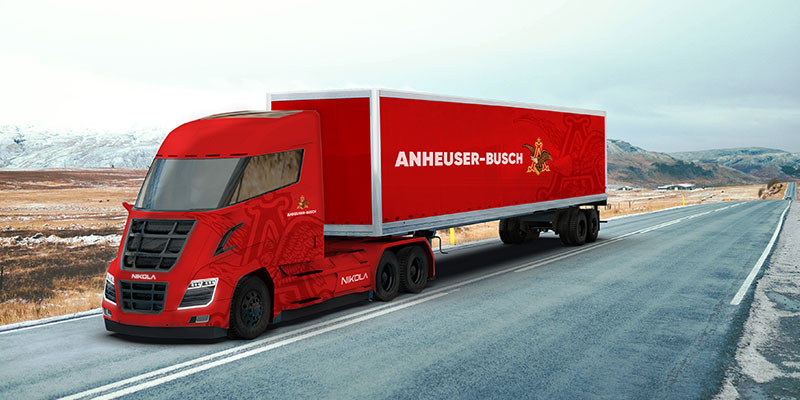Fuel Cell Customers - Medium and Heavy-Duty Transportation
Connor Dolan
By Mark Luth
It’s not just electric cars being powered by fuel cells these days – even vehicles like delivery vans and long-haul trucks are getting in on the trend. Continuing our survey of the growing deployment of fuel cells in sectors other than light-duty vehicles (click here for the first and second installments), various corporate actors are introducing fuel cell-powered medium- and heavy-duty vehicles into their commercial fleets as a way to increase sustainability. Whether operating entirely on a fuel cell powertrain or in combination with lithium-ion batteries, these vehicles demonstrate the strengths of using hydrogen to power deliveries and long-distance transportation.
DHL
Fuel cell vehicles are featured throughout logistics chains for many companies, with some delivery companies introducing hydrogen as a range extender for battery vehicles. The German delivery company Deutsche Post DHL announced in May of this year that it will deploy 100 fuel-cell powered trucks starting in 2020. FCHEA member Plug Power’s ProGen hydrogen fuel cell engine will be powering StreetScooter’s specially-designed electric van that is already a part of the fleet. Adding fuel cells will increase the effective range of these vans out to around 500 kilometers (310 miles), whereas the battery-powered vans currently have at a range of around 200 kilometers (125 miles).
DHL’s Delivery Vehicle will soon be using Plug Power’s ProGen fuel cell. Source: DHL
FedEx
In addition to DHL, Plug Power has been involved in projects with FedEx that demonstrate and test fuel cell capabilities in supply chains. The first is a delivery van fully powered by fuel cells and delivering packages in the Albany, NY area, while currently undergoing a year-long analysis that aims to obtain the data necessary to expand to a fleet of 20 trucks. The vans offer FedEx a carbon-free vehicle option that retains the typical logistical range of the existing fleet.
The other collaboration with FedEx has placed fleets of ProGen-powered cargo tuggers at the Memphis (in 2017-2018) and Albany (in 2019) airports to reduce the emissions at those locations and further test reliability and improve efficiency. These cargo tuggers possess multiple advantages to battery- and diesel-powered units, firstly that they are capable of running through the day without a need to refuel. The fuel cells also operate well under the tuggers’ daily routine, which includes significant amounts of idle time where the fuel cells function at a minimum level, before re-entering a fully-powered state.
FedEx fuel cell-powered delivery van refueling. Source: Plug Power
Anheuser-Busch
While medium-duty delivery vehicles find themselves entering delivery fleets, hydrogen fuel cell-powered heavy duty trucks are starting to make a big impression at ports. Hydrogen fuel cell powertrains provide a weight-to-power ratio that is necessary to carry out heavy-duty trucking, allowing for a reduction in emissions from this sector. Startup company Nikola is working on a commercial fuel cell-powered truck. Nikola’s first major customer is Anheuser-Busch, which has ordered up to 800 of the trucks to replace its entire U.S. fleet with zero-emission vehicles.
A photo concept for an Anheuser-Busch branded Nikola Two truck. Source: Nikola
Port of Los Angeles and Long Beach
FCHEA member Toyota is working with truck manufacturer Kenworth on a demonstration fleet in partnership with the U.S. Department of Energy at the Port of Los Angeles and Long Beach. With two trucks currently operating and hydrogen refueling infrastructure being added to the port, the trucks demonstrate that fuel cells are capable of heavy-duty freight handling.
Both heavy-duty and medium-duty fuel cell trucks can use existing practices with minimal logistical changes, including in long-haul situations. A small number of fueling stations along established routes and at the home bases of fleets allow the trucks to carry cargo. As discussed in the material handling installment, a central location for refueling means that fuel cell delivery vehicles can operate throughout the day and return to the fleet base for fuel and maintenance, while long-distance hauling can run between fueling stations. Deploying these vehicles requires new training for engineers, but otherwise represents a minimal change for operational models that are already in use.
Whether powering a delivery van, an airport cargo tugger, a port loading vehicle or a long-haul truck, fuel cell electric vehicles are gaining experience and traction. The world for hydrogen and fuel cells continues to expand, proving that clean tech solutions solve business problems as well as sustainability goals. It is, indeed, an exciting time to be in the industry!



